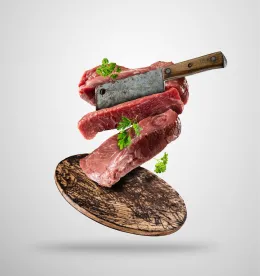When it rains, it pours—and for the country’s largest protein producers, the downpour is coming in the form of high-profile antitrust lawsuits. Over the past few years, food giants like Tyson and JBS (majority owner of Pilgrim’s Pride) have been named as a defendant in price-fixing cases relating to chicken and pork. Now, Tyson, JBS and Cargill face claims asserted by both consumers and suppliers of beef. According to these new claims, the beef producers conspired to increase their profits by both decreasing the supply-side prices they paid and increasing the prices their customers paid.
Background: The Fed Cattle Market
The “beef” between the producers and their suppliers is over the price of “fed cattle”—the cattle sold by producers to companies like Tyson and JBS that process the fed cattle into beef for resale.
From the producers’ perspective, it is imperative that the fed cattle be sold quickly because “overfed” cattle command lower sales prices and incur higher feed costs. To avoid being stuck with overfed cattle, producers sell fed cattle immediately for cash on the spot market, or through long-term, futures contracts sold on the Chicago Mercantile Exchange (“CME”).
According to the producers’ lawsuit, Tyson, JBS, Cargill, and other beef processors conspired to lower their collective purchase volume to drive down fed cattle prices. As part of the scheme, the defendants also imported foreign fed cattle, even at higher costs, to isolate the domestic suppliers. Then, once domestic prices plummeted, the defendants took turns bidding on fed cattle to avoid bidding wars. And because spot market prices affect prices of futures contracts, the complaint alleges the defendants are also liable for manipulating the CME.
Beef Consumers Join the Fray
A week after the producers’ complaint was filed, a class action complaint was lodged on behalf of beef consumers alleging that defendants coordinated to artificially restrict output, which in turn drove up prices. Similar to the allegations levied in the chicken and pork cases, the beef consumer complaint alleges that the producers used a benchmarking service called Agri Stats to exchange confidential business information and facilitate their coordinated output reductions.
What to Watch For
After chicken and pork, beef purchasers had cause for concern that they too had been unfairly overcharged by their suppliers. The filing of the class actions against the beef manufacturers last month affirmed those concerns and marks the high-water of the recent antitrust onslaught against “Big Food.” The similarity of the allegations made in each of the cases—namely, the de-anonymizing of confidential and proprietary Agri Stats information as a mechanism for collusion—is also striking. In many ways, these cases will invariably feed off one another. The consumer class complaint in beef, for example, incorporates a discussion of how Agri Stats facilitated collusion in the pork market. And, because many of the large scale purchasers of beef (i.e. distributors and retailers) are already involved in the tuna, chicken, and pork, they will have the unique advantage to know just what to watch for as the beef class action progresses.
With every protein staple in the American diet now the subject of significant antitrust scrutiny, we will continue to look out for additional investigations into collusive conduct in other areas of the supermarket. Indeed, just weeks ago, a class action was filed in the Southern District of Florida alleging price-fixing of farm-raised salmon.





 />i
/>i

